

Mount Tavurvur, Papau New Guinea, 1994. Smithsonian Institution - Global Volcanism Program: Worldwide Holocene Volcano and Eruption Information. Which volcanoes are erupting? - List & map of active volcanoes erupting at present / VolcanoDiscovery. 5 facts you didn’t know about homelessness - Mission Australia. Why women are considered the hidden homeless - sbs.com.
"I want you to ask yourself this one question: how hard is it to be a parent?”

Says Melbourne-based mum, Vicky Vacondios. Solid Waste Management. Context Around the world, waste generation rates are rising.
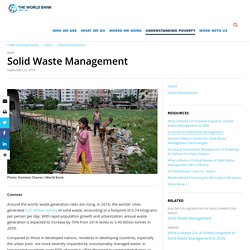
In 2016, the worlds’ cities generated 2.01 billion tonnes of solid waste, amounting to a footprint of 0.74 kilograms per person per day. With rapid population growth and urbanization, annual waste generation is expected to increase by 70% from 2016 levels to 3.40 billion tonnes in 2050. Compared to those in developed nations, residents in developing countries, especially the urban poor, are more severely impacted by unsustainably managed waste. US top of the garbage pile in global waste crisis. Image copyright Getty Images The world produces over two billion tonnes of municipal solid waste every year, enough to fill over 800,000 Olympic sized swimming pools.
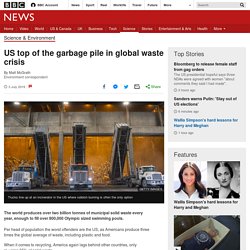
Per head of population the worst offenders are the US, as Americans produce three times the global average of waste, including plastic and food. When it comes to recycling, America again lags behind other countries, only re-using 35% of solid waste. Germany is the most efficient country, recycling 68% of material. The world agrees there's a plastic waste crisis—can it agree on a solution? This article was created in partnership with the National Geographic Society.
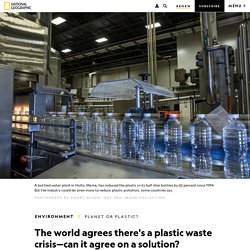
It didn’t take long after the recent United Nations environmental assembly in Kenya ended for environmentalists to sharply rebuke the United States for allegedly derailing global ambitions to prevent plastic debris from flowing into the oceans. “The tyranny of the minority,” their statement declared as environmentalists denounced the Americans for what they said was slowing progress on marine plastics by diluting a resolution calling for phasing out single-use plastic by 2025 and blocking an effort to craft a legally binding treaty on plastic debris. Yet that unsparing critique doesn’t fully reflect the negotiations that played out in a small roof-top conference room on the UN’s campus in Kenya’s capital city of Nairobi.
What happened is perhaps best viewed not as tyrannical but as isolationist, more akin to the U.S. withdrawal from the Paris climate agreement. International treaties? The Global Garbage Crisis: No Time to Waste. Osaka, Japan, 6 November 2012 - With approximately 1.3 billion tonnes of municipal waste generated each year, and volumes expected to increase to 2.2 billion tonnes by 2025 according to World Bank figures, urgent action is needed to head off the threat to the environment and human health posed by this global waste crisis.
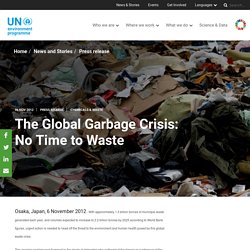
This growing problem was foremost in the minds of delegates who gathered at the biennium conference of the UNEP-hosted Global Partnership on Waste Management (GPWM), held on November 5 and 6 in Osaka, Japan, The conference brought together waste experts from around the world to find answers to the global challenge of waste management and reap the economic and environmental benefits through better coordination. The threat posed by poor waste management is particularly prominent in low-income countries where waste-collection rates are often below 50 per cent. EU Environment Agency. Introduction Europe's economy depends on an uninterrupted flow of natural resources and materials, including water, crops, timber, metals, minerals and energy carriers.
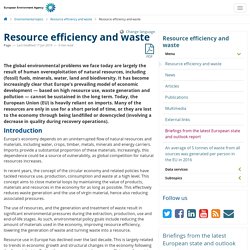
Imports provide a substantial proportion of these materials. UN - Report: Policies to reduce Homelessness among Women and Female Headed –Households. Older Women’s Risk of Homelessness - Australian Human Rights Commission. Japan earthquake and tsunami of 2011. Rare Video: Japan Tsunami. Japan Earthquake & Tsunami of 2011: Facts and Information. On March 11, 2011, a magnitude-9 earthquake shook northeastern Japan, unleashing a savage tsunami.
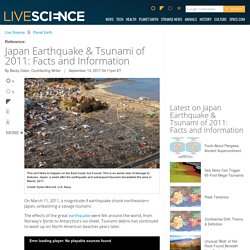
Fast Facts about the Japan Earthquake and Tsunami. Why was Japan's March 11 earthquake so big?
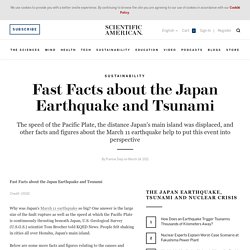
One answer is the large size of the fault rupture as well as the speed at which the Pacific Plate is continuously thrusting beneath Japan, U.S. Geological Survey (U.S.G.S.) scientist Tom Brocher told KQED News. State of Homelessness in Countries with Developed Economies. World Health Organization. Chronic disease—Australia’s biggest health challenge. Integrated chronic disease prevention and control.
Global hunger continues to rise, new UN report says. World hunger is still not going down after three years and obesity is still growing – UN report. An estimated 820 million people did not have enough to eat in 2018, up from 811 million in the previous year, which is the third year of increase in a row.
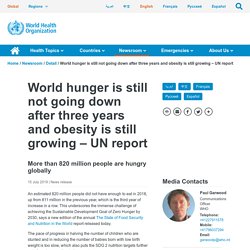
This underscores the immense challenge of achieving the Sustainable Development Goal of Zero Hunger by 2030, says a new edition of the annual The State of Food Security and Nutrition in the World report released today. The pace of progress in halving the number of children who are stunted and in reducing the number of babies born with low birth weight is too slow, which also puts the SDG 2 nutrition targets further out of reach, according to the report. At the same time, adding to these challenges, overweight and obesity continue to increase in all regions, particularly among school-age children and adults.
The chances of being food insecure are higher for women than men in every continent, with the largest gap in Latin America. Slow progress in Africa and Asia. 'Us and them': What homelessness looks like around the world. The State of Homelessness in Developing Countries. How air pollution is destroying our health. As the world gets hotter and more crowded, our engines continue to pump out dirty emissions, and half the world has no access to clean fuels or technologies (e.g. stoves, lamps), the very air we breathe is growing dangerously polluted: nine out of ten people now breathe polluted air, which kills 7 million people every year.
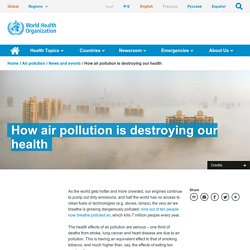
The health effects of air pollution are serious – one third of deaths from stroke, lung cancer and heart disease are due to air pollution. This is having an equivalent effect to that of smoking tobacco, and much higher than, say, the effects of eating too much salt. Air pollution is hard to escape, no matter how rich an area you live in. It is all around us. Microscopic pollutants in the air can slip past our body’s defences, penetrating deep into our respiratory and circulatory system, damaging our lungs, heart and brain. Department of Agriculture, Water and the Environment.
The World Health Organization (WHO) recognises ambient (outdoor) air quality as a major environmental risk to health. Worldwide, an estimated 3.7 million premature deaths (under age 60) were found to be attributable to ambient air pollution in 2012.1 Household (indoor) air pollution is also an important global environmental health risk for an estimated 3 billion people worldwide, especially those in low and middle income countries where biomass fuels and coal are commonly burned for cooking and heating.2 Worldwide, an estimated 4.3 million deaths in 2012 were attributable to household air pollution.3 Figure 1.
Global deaths attributable to ambient and household air pollution in 2012, by region1,3. The most affected regions are South East Asia and the low and middle income countries in the Western Pacific. Air pollution, facts and information. Despite decades of progress, the air quality in the United States has started to decline over the past few years, according to data provided in summer 2019 by the Environmental Protection Agency. The agency recorded 15 percent more days with unhealthy air in the country in 2018 and 2017 compared to the average from 2013 to 2016. The reasons for the recent decline in air quality remain unclear, says the agency, but may be related to high numbers of wildfires, a warming climate, and increasing human consumption patterns driven by population growth and a strong economy.
The long-term outlook also remains unclear, even as politicians debate air pollution standards. Representation of Women in the Senate. Women still underrepresented in Parliament after 2019 federal election. Nigeria country profile - BBC. After lurching from one military coup to another, Nigeria now has an elected leadership. Nigeria - Open Doors USA - Open Doors USA. Extremist attacks and religious oppression Christians in the northern region and in the Middle Belt suffer from violence perpetrated by Islamic extremist groups such as militant Fulani herdsmen and Boko Haram. Habitat loss threatens all our futures, world leaders warned. Impact of habitat loss on species. The Global Impacts of Habitat Destruction – National Geographic Society Newsroom. Environment, land and water. What's happening to Australia's biodiversity?
Some scientists believe that we are now witnessing the sixth mass extinction, the only mass extinction caused by a single species - humans. Did megafauna that used to roam Australia become extinct because of climate change or because of hunting? How have population growth, habitat change and introduction of new species affected Australia's biodiversity? What is biodiversity? Department of Agriculture, Water and the Environment, Australian Government. Gender Equality.
World Vision Australia. Education. United Nations. About Bioenergy - Bioenergy Australia. Imagine energy made from renewable sources that could fuel your car, warm your home, or transport a plane. This energy source is not a fossil fuel, unlike petroleum, it is sustainable and increases the security of our energy supplies. Clean Energy Regulator Clean Energy Regulator - Home.
IPCC — Intergovernmental Panel on Climate Change. Climate Change in Australia. GBRMPA - Climate change. Department of the Environment and Energy, Australian Government. Climate Change.